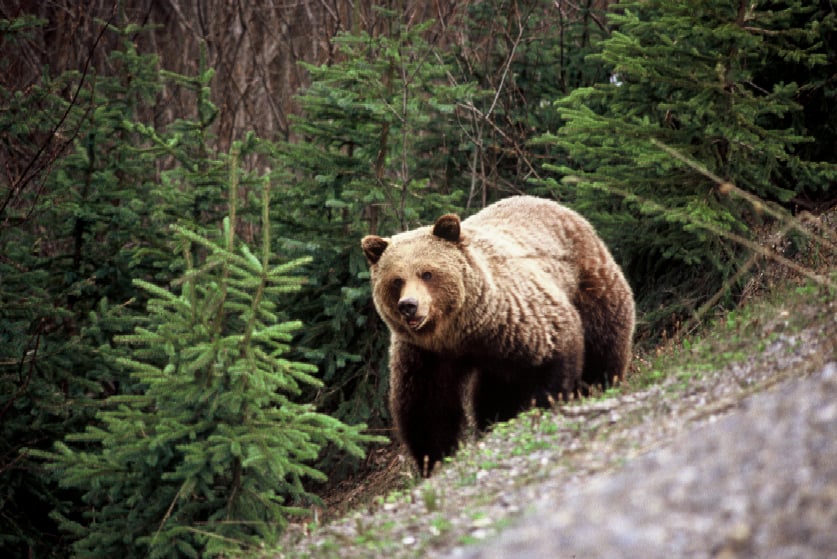The new B.C. government announced on Monday it will end grizzly bear trophy hunting throughout the province and stop all hunting of grizzles in the Great Bear Rainforest.
“By bringing trophy hunting of grizzlies to an end, we’re delivering on our commitment to British Columbians,” Doug Donaldson, Minister of Forests, Lands, Natural Resource Operations and Rural Development, said. “This action is supported by the vast majority of people across our province.”
A public opinion poll conducted by Insights West in February 2017 found strong opposition to trophy hunting across Canada (80 per cent), including 90 per cent of British Columbians.
The ban will take effect Nov. 30 — after this year’s hunt.
Hunting for meat will be allowed to continue. Historically, environmentalists have critiqued exceptions for food hunting, saying it leaves the door open for trophy hunting.
“We’re pretty dubious about the whole notion of classifying any killing of grizzlies as a food hunt,” said Chris Genovali, executive director of Raincoast Conservation Foundation, a group that has campaigned against the trophy hunt.
“If the food hunt policy is going to have any chance of having an effect, at the very least you’d have to force the hunters to surrender the trophy parts to provincial authorities in an attempt to de-incentivize why people go out and kill these animals.”
While reserving judgment on the trophy hunting ban until further details are released, Raincoast Conservation Foundation called the end of the grizzly bear hunt in the Great Bear Rainforest “a solid step forward for wildlife management in British Columbia.”
According to B.C. government statistics, about 300 grizzlies are killed each year by trophy hunters. Eighty-seven per cent of known, human-caused grizzly bear deaths in B.C. are attributable to trophy hunters, who have killed 12,026 grizzly bears since the government began keeping records in 1975.
Foreign hunters account for about 30 per cent of all trophy kills in B.C. in any given year and they can pay upwards of $30,000 for the proper permits and the assistance of a guide outfitter. Former premier Christy Clark supported the grizzly trophy hunt and the BC Liberals received nearly $60,000 in donations from guide outfitter associations since 2005.
Earlier this year, Safari Club International put its name behind a $60,000 fundraising effort for the Guide Outfitters Association of BC. In a post on Facebook, the Canadian chapter for Safari Club International wrote: “NDP have vowed to end the Grizzly hunt in BC if elected. SCI chapters from CANADA and the USA banded together donating $60000.00.”
Until now trophy hunting has even been allowed within some of B.C.’s provincial parks and protected areas. A 2012 report by Stanford University in conjunction with the Center for Responsible Travel found that bear viewing groups in the Great Bear Rainforest generated “more than 12 times more in visitor spending than bear hunting.”
The government will consult with First Nations and stakeholder groups to determine next steps and mechanisms as B.C. moves toward ending the trophy hunt, according to a press release.
In late 2016, the International Union for Conservation of Nature (IUCN) assessed the world’s brown bear populations, and identified eleven around the world as critically endangered. Three of those are in Canada — all in southwest B.C.
The Coast to Cascades grizzly bear initiative warned on Monday that without stronger management of the species and their habitat — beyond hunting — grizzlies are still in grave danger.
“Many British Columbians are not aware that for years there has been no legal hunt for the most at-risk populations of grizzly bears in B.C., yet some of these populations continue to decline to perilous levels,” said Johnny Mikes, field director for Coast to Cascades. “Even though the province will end the B.C. grizzly bear trophy hunt in its entirety, it is only improved management focused on habitat and non-hunting threats that will benefit the bears in these depressed and declining populations.”
The B.C. auditor general's office is expected to release a report on the effectiveness of grizzly bear management in B.C. sometime this fall.
* Story updated on Aug. 15, 2017 at 10:20 a.m. ![]()
Read more: BC Politics, Environment















Tyee Commenting Guidelines
Comments that violate guidelines risk being deleted, and violations may result in a temporary or permanent user ban. Maintain the spirit of good conversation to stay in the discussion.
*Please note The Tyee is not a forum for spreading misinformation about COVID-19, denying its existence or minimizing its risk to public health.
Do:
Do not: